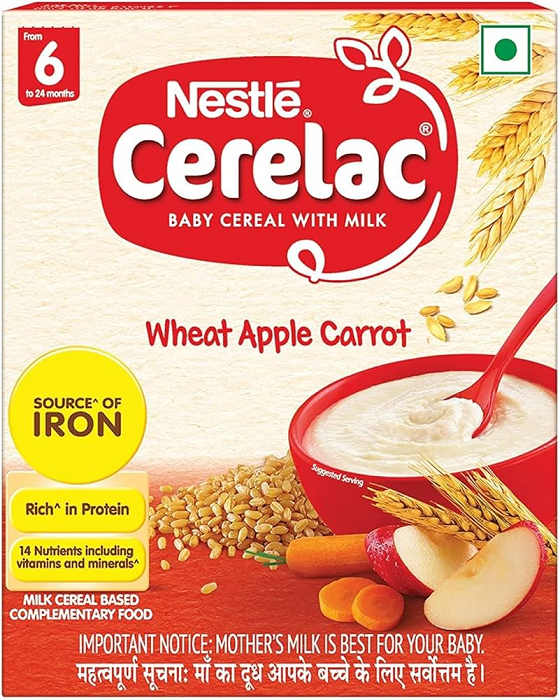
Celebrating 50 years in the Indian market, Nestlé India has announced the launch of new variants of its infant food brand Cerelac without refined sugar. The company will expand its Cerelac range to 21 variants, 14 of which will be refined sugar-free. Seven variants will be available by November 2024.
The company that over the last five years, added sugar has been reduced in Cerelac by up to 30% as a part of its innovation journey. “We have achieved our ambition of introducing ‘Cerelac’ variants with no refined sugar. This was initiated three years ago and has culminated this year with the introduction of new Cerelac variants with no refined sugar,” Suresh Narayanan, chairman and managing director of Nestlé India, stated.

The first batch of Cerelac was manufactured by Nestlé India’s flagship factory in Moga, Punjab on 15 September 1975. Today, the products are made at the Moga factory in Punjab and Samalkha factory in Haryana.
Over the past five decades, Cerelac says it is using high-quality ingredients, including grains and milk that are sourced locally. Every batch of Cerelac undergoes rigorous quality checks (over 40 quality tests) to ensure that every pack is safe for consumption.
Since its introduction in India, Cerelac has been offering complementary food for infants above 6 months. Cerelac’s nutrition product recipes are developed in collaboration with Nestlé’s global R&D network, together with local expertise and international innovation, the company said.
Nestlé India says it works closely with local farmers, upskilling and training them to ensure sustainable and responsible sourcing of ingredients, reducing its carbon footprint and preserving the planet for future generations. Through the successful implementation of Zer’ Eau technology in Moga and Samalkha factory, water extracted from milk is recycled to reduce groundwater consumption every year, thereby reducing reliance on groundwater.
Financial results
Earlier, on 17 October, the Board of Directors approved the financial results (standalone and consolidated) for the second quarter of 2024-25.
Suresh Narayanan said on the financial results, “Despite a challenging external environment with muted consumer demand and high commodity prices especially for coffee and cocoa, we remained resilient in our pursuit to deliver growth. This quarter, five of our top 12 brands grew at double-digits. However, some key brands witnessed pressure due to softer consumer demand and we focus on them and have in place robust action plans. It is heartening to note that in the last 9 months, 65% of our top 12 brands including Maggi noodles showed positive volume growth.
“I am pleased to share that our beverages business continued to do well and has posted high double-digit growth backed by strong performance across Nescafé Classic, Nescafé Sunrise, and Nescafé Gold, which can be attributed to category recruitment and premiumization of coffee. Milkmaid also reported high double-digit growth.”
Financial highlights – Q2, FY24-25 :
- Total sales: Rs 5,074.8 crore
- Total sales growth: 1.3%.
- Domestic sales growth: 1.2%.
- Profit from operations: 21.0% of sales
- Net profit: Rs 986.4 crore
Muted demand
Addressing reporters in Haryana, Narayanan said that food inflation was hitting urban areas the worst while the demand was recovering in rural swathes, as it reported a one per cent year-on-year dip in its consolidated net profit for the second quarter of financial year 2024-25, Business Standard reported.
“Pressure points” for the fast-moving consumer goods (FMCG) sector are now emerging from mega cities and metros, Narayanan said on 22 October. “The market is facing muted demand as growth in the F&B (food and beverages) sector, which used to be in double digit a couple of quarters ago, is now down to 1.5-2%. While the tier I and below towns and rural areas seem to be reasonably stable, the pressure points are coming from mega cities and metros…It is almost like we are operating in two Indias,” Narayanan told reporters.
Narayanan pointed to growing commodity costs — namely coffee and cocoa — which have reached 10 year highs. While coffee prices have jumped 60 per cent since last year, cocoa prices have risen by almost 2.5 times, leading to an average increase in prices for consumers by up to 15-30%. “We try to protect the lower price points and take price increases on the larger packs. This has led to a subdued, but positive volume growth (in coffee),” Business Standard quoted him as saying.
IndiFoodBev — authentic, impactful and influential
An English-language food and beverage processing and packaging industry B2B platform in print and web, IndiFoodBev is in its third year of publication. It is said that the Indian food and beverage industries represent approximately US$ 900 billion in revenues which implies more than 20% of the country’s GDP. Eliminating the wastage on the farmside can help to deliver more protein to a higher number of the population apart from generating sizable exports. The savings in soil, seeds, water, fertilizer, energy and ultimately food and nutrition could be the most immense contribution that country is poised to make to the moderation of climate change.
To improve your marketing and grow sales to the food and beverage processing and packaging industry, talk to us. Our research and consulting company IppStar [www.ippstar.org] can assess your potential and addressable markets in light of the competition. We can discuss marketing, communication, and sales strategies for market entry and growth.
Suppliers and service providers with a strategy and budget for targeted marketing can discuss using our hybrid print, web, video, and social media channels to create brand recognition linked to market relevance. Our technical writers are ready to meet you and your customers for content.
The second largest producer of fruit and vegetables in the world is continuously expanding processing capacities and delivery systems with appropriate innovative technologies. We cover product and consumer trends, nutrition, processing, research, equipment and packaging from farm to thali. Get our 2025 media kit and recalibrate your role in this dynamic market. Enhance your visibility and relevance to existing markets and turn potential customers into conversations. Ask for a sample copy of our bi-monthly in print or our weekly IndiFoodBev eZine each Wednesday.
For editorial info@ippgroup.in — for advertisement ads1@ippgroup.in and for subscriptions subscription@ippgroup.in
Naresh Khanna – 10 February 2025
Subscribe Now










